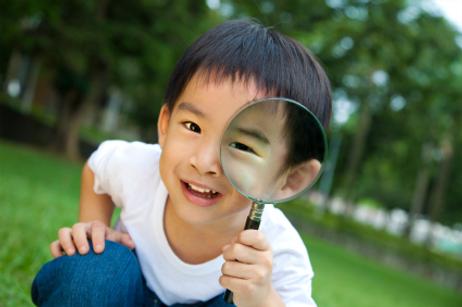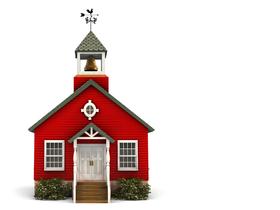Progressive schools are different from so-called traditional schools. I am not being judgmental here. I am simply pointing out some differences between the two kinds of schools so that you can make an informed decision about which private schools to consider for your child.
Until the middle of the 20th-century, many schools simply taught their students facts and figures. You memorized and regurgitated information. Indeed I can remember being taught this way at Rosyln School and Westmount High School back in the '50s and '60s. That's just the way you were taught back then. All of your academic work was focused on what you could expect to be tested on in your final year-end exams. This all led inexorably to a forbidding set of examinations known as the Junior Matriculation. If you did well on that set of examinations administered at the end of Grade 11, you went off to university for more of the same.
Progressive schools by definition are schools that espouse the ideals and ideas of landmark educators and thinkers such as John Dewey and Francis Parker. At the beginning of the 20th-century, they were considered visionary by some, radical by others. The progressive curriculum was more varied and experiential. Students just didn't sit there passively listening to a teacher lecture about the material. They actually were encouraged to learn by discovery through a variety of hands-on activities. Teachers no longer had to get through a plethora of outdated materials simply to be able to say that they had 'covered' the required coursework. There was time to stop and explore. Have discussions. Stimulate analysis. Encourage critical thinking.
Here is an overview of John Dewey and his views on progressive education.
Naturally, there was no room for the rigid, deadline-studded curriculum of math and English leading to an intense last-minute binge of test-preparation in your junior and senior year for the AP exams which take place in May of your senior year.
As you can imagine, teaching to the test became a critical part of every teacher's daily routine. If you didn't get good test results, you weren't a good teacher. And, worse, the students were not learning.
Progressive schools have managed to get wonderful results by teaching their students in all sorts of ways. Passive learning went out. Active learning was the norm. Indeed learning takes place across the curriculum and throughout every aspect of the school community. Learning is not compartmentalized or relegated to a classroom.
You also won't see academic tracks with names such as 'advanced' or regular. Progressive schools teach to all levels of attainment. They respect each student's diversity. They don't see those differences as strengths or weaknesses. This approach, in turn, leads to greater respect for each individual in the school community.
Students don't receive traditional report cards.
Starting with the earliest years in Montessori, Waldorf and Reggio Emilia schools, a child's progress is charted by accomplishments, not by test results. You will not see a traditional report card studded with As and Bs if your child attends a progressive school. You will receive a written assessment of your child's achievements, thoughtfully composed by your child's teacher.
This brief video contrasts Montessori with traditional teaching methods.
Assessments and evaluations of your child's work are discussed rather than being issued from on high. It is part of the collaborative process which is a hallmark of progressive education. You can expect to receive an evaluation of your child's progress several times a year in most schools.
The overall approach is student-centered, not test-centered.
When you visit a progressive school, you will see evidence of this student-centered approach all about you. You will have to experience it for yourself to understand all the implications for your child. We always thought of our children as sponges. It sounds a bit prosaic, but children really do learn by absorbing everything around them. They learn by doing, touching, feeling and developing sensory-motor skills.
Progressive school classrooms create an environment for learning. Younger children feel at home and comfortable in classrooms which are set up in an inviting as opposed to intimidating manner. Classrooms are usually multi-age, meaning that the traditional groupings by grade do not apply. There is no Grade 1 or Grade 2 and so on. The learning is structured according to the children's needs and abilities. Teachers guide the learning which always has the goal of developing the whole child.
When you send your child off to a progressive school, you can be assured that she will experience everything. Ideas, tasks, interactions and all the other aspects of a school community will be explored, analyzed and experienced from every possible angle. This emphasis on discovery is a critical component in an educational philosophy that is based on a partnership of teacher, child, and classroom.
The end product of a progressive education ideally is a student who can think and who can cope with everything life will put on her plate. That's a good thing in this dynamic 21st-century world in which she will have to make her way.
Progressive schools are only for young children, right?
It is true that there are more progressive schools for the primary grades and the number of progressive schools available to the middle school and high school grades is relatively small. Progressive high schools offer a different approach to secondary education. For example, here is how The Putney School describes itself:
"We are a progressive (link is external), a secondary school for boarding and day students, situated on a 500-acre working dairy farm in southern Vermont. Central to the fundamental beliefs articulated by our founder Carmelita Hinton in 1935, is the vision that education is something to be actively pursued rather than passively received. We teach to the whole individual, through discussion-based humanities classes, the scientific discovery method, extensive artistic opportunities, and a student-lead work program."
You don't see AP courses as part of the academic curriculum in progressive high schools. That's just not how they teach. Teaching to tests and standardized testing is not part of their programs. Ok, I know what you are thinking. "How will my child get into a good college?" College acceptance works just the way it has always worked. If your child offers what the college is looking for, her chances will be pretty good. When you review the list of colleges to which Putney graduates have matriculated, you will see what I mean.
Let me sum up by noting as I have noted so many times: the best private K-12 school for your child is the one that fits your needs and requirements best. That will not necessarily be a traditional school or a progressive school. You will recognize it the minute you visit the campus. While having a plethora of educational options can be bewildering, still, it is a very nice position to be in as you plot your child's education.
Questions? Contact us on Facebook. @privateschoolreview























